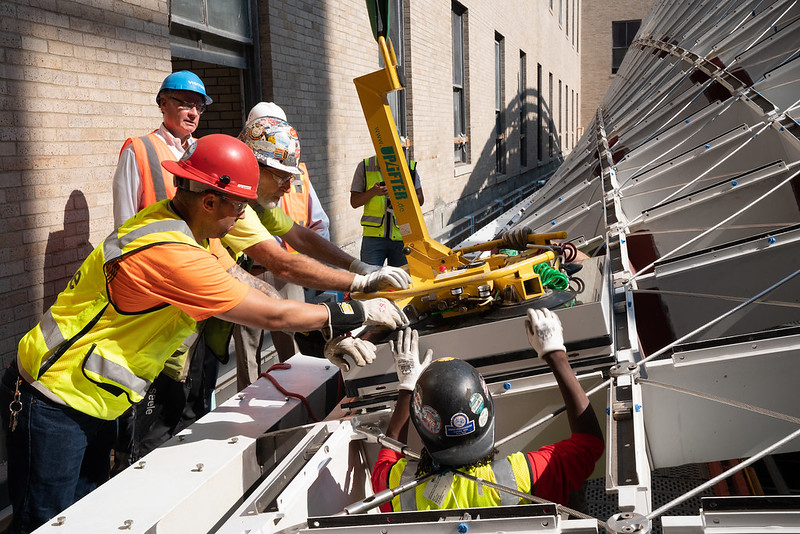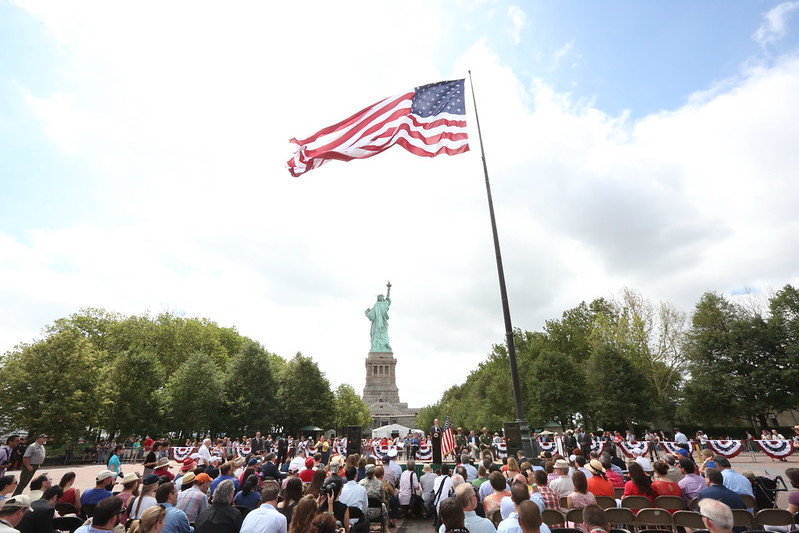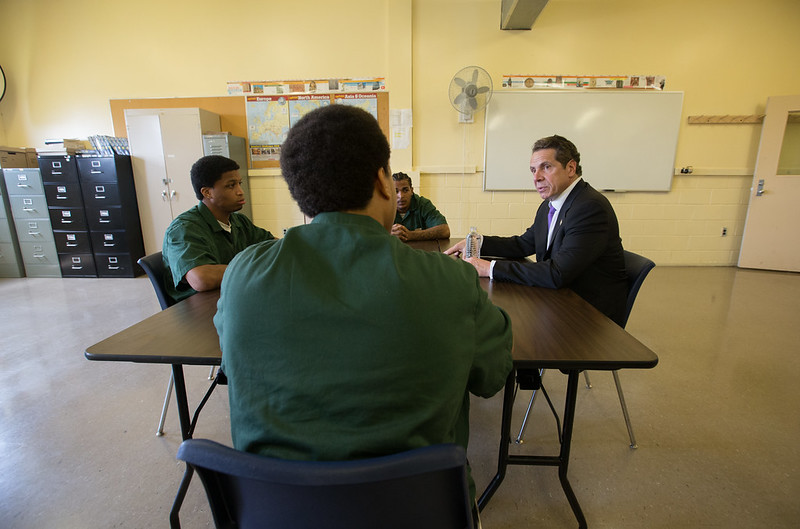Prevailing Wage is Economic Stimulus - New York Should Expand It Now

Construction workers, and many others, can benefit from prevailing wage expansion (photo: governor's office)
Massive unemployment following a period of slow recovery left 19 percent of Americans out of work. That was in 1938, when New York officially wrote the prevailing wage into the State Constitution, requiring projects that receive taxpayer funds to pay fair wages to their workers. Still deep into the Great Depression, New Yorkers understood that blue collar workers were the foundation of the economy and key to sustained economic growth.
Fast forward to today’s crisis and opponents of the prevailing wage are recycling old arguments against current prevailing wage legislation — arguments that did not work then and should not work now.
New York has an opportunity to provide a powerful economic stimulus at a critical time in our history by closing a loophole in its prevailing wage law so that private projects receiving significant public subsidies are covered. The underlying principle of the prevailing wage is straightforward: when public funds are used to subsidize and incentivize construction, public assistance should not be used to drive down wages or undercut benefits. It should instead uphold a community’s labor standards. This policy protects local economies and small businesses by maintaining higher consumer demand for goods and services.
Much has changed in the way projects are procured and financed since the prevailing wage was enacted by statute in 1894 and written into New York’s Constitution in 1938. Today public resources are leveraged creatively to attract private economic development. State policy needs to reflect this modern reality. However, New York is one of only 11 states that enable private developers to receive public assets without paying prevailing wages and benefits.
There are many reasons why expanding the prevailing wage is good public policy, especially during a weak economy. These standards provide a powerful economic stimulus for working families and local communities while generating much needed tax revenue for public programs. That’s how it helped spur New York’s economy during the tail end of the Great Depression.
The economic impact is significant. Total family income for construction workers is estimated to be at least 12.5% higher in prevailing wage states. Every dollar spent on prevailing wage jobs is estimated to generate $1.50 for local economies. Fair wages empower working families to buy cars, homes, appliances, and clothing. More discretionary income means larger turnout at restaurants and theaters and a greater ability to secure the necessary savings for education, health care, and retirement.
Stimulating New York’s economy, increasing state revenue, and wise management of public resources has never been more important than now. One very practical and fair way for lawmakers to do that is by expanding New York’s prevailing wage law, and they should do it now.
***
Fred B. Kotler is a policy analyst at the New York State School of Industrial and Labor Relations, Cornell University. He is the author of New York State Prevailing Wage Law: Defining Public Work, a report prepared for the New York State Senate in 2018.
***
Have an op-ed idea or submission for Gotham Gazette? Email This email address is being protected from spambots. You need JavaScript enabled to view it.
Looking Ahead to a New New York

New York must take learn key leassons as it moves ahead (Photo: Spencer T Tucker/Mayor's Office)
Though it feels like an eternity, it was only about a year ago that Amazon walked away from plans to build a second headquarters in Long Island City. The online juggernaut was scared out of town by a short-sighted public debate that centered on legitimate concerns about gentrification and displacement but underplayed future-looking arguments about economic growth. At the time I argued, as a former city official during the dark days after September 11, 2001, that when a similarly tough tragedy darkened our doorsteps we would rue the day we turned Amazon and its tens of thousands of jobs away. Sooner than anyone could have anticipated, that day is here.
In the wake of this global coronavirus pandemic that has taken a particular toll on vibrant, dense cities like New York, I am skeptical that we will experience much gentrification or displacement in the months and years ahead due to a drop in demand. Our economy is retracting, unemployment is skyrocketing, and we have no clue when a recovery might even begin. As a veteran of 1987’s “Black Monday,” 9/11, and the economic collapse of 2008, I know that a downturn like the one we are entering has a disproportionate impact on low-income communities, particularly because of the contraction the city’s budget will face as our economy shrinks.
After 9/11 the city’s budget was approximately $43 billion; our current municipal budget is well over double that, primarily because of the extraordinary and diverse economic growth encouraged by the administration of Mayor Michael Bloomberg. Yes, that growth came with serious costs like those from gentrification and stop-and-frisk, but it also created the ability to massively invest in affordable housing, parks, school improvements like universal pre-kindergarten, and other public benefits that most American cities envy.
We are now about to witness the reverse of that process as our employment and tax base shrinks in the face of COVID-19. Every job we can hang onto will count. Working New Yorkers will sorely miss the employment—particularly the blue-collar jobs—that we lost when Amazon chose to build instead in only Virginia.
It’s true that Amazon subsequently leased some office space in Hudson Yards, but that represents a small fraction of the jobs that would have come, and more importantly, that space is for white collar professional jobs, unlike the originally proposed job mix for Western Queens. It’s also true that Amazon is a flawed company, with issues about labor standards, support of ICE, and lack of federal tax payments. But we can’t really apply pressure to address those issues in Virginia, and as we stare this current crisis in the face, arguments about tax discounts seem hopelessly naïve with the unemployment rolls skyrocketing by the day.
All that said, it is not fruitful to re-litigate the Amazon deal, particularly at this tragic time. But this period should serve as a reminder to those who fight all economic development that the problems our city faces are not static. New York City is now the national epicenter of this pandemic, and all New Yorkers must fight to restore global faith in our city and all that it represents.
As this virus eventually fades, we must remind people of what makes New York vital, of all that we missed confined in our homes – the buildings, subways, schools, streets, parks, museums, and theaters. We must revive our commerce and our culture, and we must do it together.
This will not be the physical reconstruction that 9/11 demanded. It will be a psychological reconstruction, a doubling down on density that will not be easy given what people are going through. We can begin by reminding ourselves of who we are, the city that was resilient in the face of pandemics past, the city that recreated itself in the aftermath of attacks and downturns, a city that has remade itself again and again.
As we reconstruct the idea of our city, we should turn down the heat and look to the light. Some—some—of our fellow citizens raised legitimate concerns with the Amazon deal, and they will continue to raise real concerns for our city’s neediest. As we move ahead, even as we disagree, let’s listen to each other with less polarization, let’s listen to science and experts, and let’s not just rebuild our old economy and old city, but a new city resilient to the shocks we know are coming, like an employment crisis, a housing shortage, and the biggest shock of them all, climate change.
Let’s look forward to a new New York, a better and fairer New York, a New York where we can listen and learn.
***
Vishaan Chakrabarti is an architect and author. On Twitter @VishaanNYCA.
***
Have an op-ed idea or submission for Gotham Gazette? Email This email address is being protected from spambots. You need JavaScript enabled to view it.
Elected Leaders Must Do Everything They Can to Limit Coronavirus Spread Among the Most Vulnerable — Including Shrinking Incarcerated Populations and No Bail Rollback

Gov. Cuomo visits a correctional facility (photo: governor's office)
Last week, the inevitable happened: the first cases of COVID-19 in Rikers Island jails and upstate prisons were confirmed.
We are on the precipice of a public health catastrophe in New York’s jails, prisons, and communities most impacted by mass criminalization and incarceration. COVID-19 can spread like wildfire through the state’s jails and prisons, where social distancing is all but impossible.
Much of this is preventable.
Right now, access to the basics, like soap and water, is limited and restricted. Testing and medical procedures vary across different jails and prisons, and many struggle to get even their most basic medical needs met. Jails and prisons by their design push people to an earlier death.
Yet incomprehensibly, in the throes of a crisis that threatens to overwhelm our public health systems, the Governor and state Legislature are still considering rolling back newly-enacted bail and other pre-trial reforms. All across the United States and the world, officials are urgently depopulating prisons. Meanwhile, New York’s politicians are rushing, behind closed doors, to put more New Yorkers behind bars.
This is traditional New York politics at its worst. It’s recklessly irresponsible and it will cost lives.
Jails and prisons might be located far out of sight, but they are not disconnected from New York’s communities. They are open 24-hours-a-day with staff coming and going and people constantly being released back into their communities. The health dangers in jails and prisons are not just confined within their walls—they put countless people throughout the state at risk of contracting the virus. Communities of color, especially black neighborhoods, are particularly vulnerable as a disproportionate number of incarcerated New Yorkers hail from these communities.
We’re already seeing a wave of incarcerated people released based on common-sense approaches and effective public health strategies. The New York City Board of Corrections has recommended releasing people who are over the age of 50, have underlying health conditions, have been detained for administrative reasons, and/or are serving sentences of less than a year. Brooklyn District Attorney Eric Gonzalez has vowed to temporarily stop prosecuting low-level offenses. The organization Releasing Aging People from Prison has called on Governor Cuomo to provide clemency to the elderly and people with compromised immune systems from state prisons.
That is why it’s mind-boggling that the Governor is still considering rollbacks to bail reform that would undoubtedly increase our jail population. The changes being discussed would give judges the power to remand people without the possibility of release pre-trial and would disproportionately impact people of color. While Cuomo and Senate Democrats are framing these rollbacks as progress, their proposal would not only bring us back toward the broken system bail reform was meant to address, but increase the risk of the virus spreading at the very moment we are taking drastic steps to protect other vulnerable populations.
Rather than focus on regressive rollbacks, Governor Cuomo should take additional measures to reduce our jail and prison population. He should grant clemency to criminalized survivors of gender and sexual violence, and release people from state prisons with less than a year left on their sentences. He should work with localities so the Departments of Correction can quickly approve the release of people from local jails under their jurisdiction. And he should of course take bail rollbacks off the table during state budget negotiations.
As the coronavirus threat emerged, Governor Cuomo boasted in a press conference that hand sanitizer is being produced by incarcerated New Yorkers -- hand sanitizer that has been considered contraband in our jails and prisons. Instead of exploiting their labor, it’s time New York State offered incarcerated people and the communities they come from the same care and protections being offered to all New Yorkers.
***
Mark Winston Griffith is Executive Director of Brooklyn Movement Center. On Twitter @GriffithMW & @BKMovement.
***
Have an op-ed idea or submission for Gotham Gazette? Email This email address is being protected from spambots. You need JavaScript enabled to view it.




